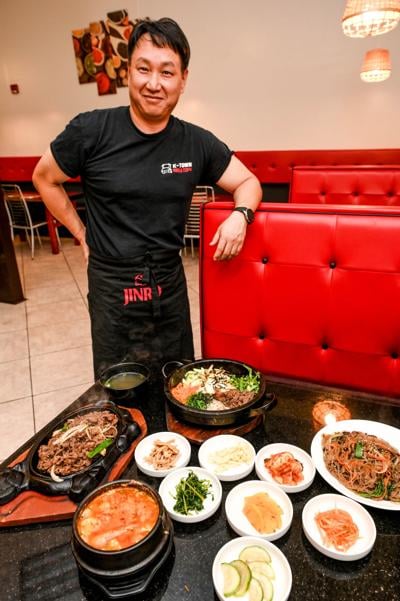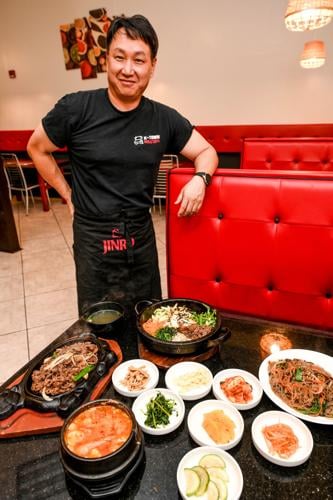David Park challenges curious eaters to try his home-style Korean food.
“I don’t think too many people here know Korean food,” says the owner of K-Town BBQ & Tofu, which sits next to Hong Kong Food Market in Gretna. “Vietnamese, Chinese, sushi, yes, but even my staff wasn’t familiar with our cuisine.”
The spacious restaurant, with its entrance opening from the atrium shared with Hong Kong Market, housed Vietnamese restaurants for many years. Park noticed the space was vacant since before the pandemic and signed the lease after Hurricane Ida. K-Town opened at the end of June. The only Korean restaurant on the West Bank, K-Town is Park’s first foray into the local market.
Park, who worked concessions at the Ernest N. Morial Convention Center along with his brother for the three years before the pandemic, has experience running Korean restaurants in Florida. His wife and son live in Los Angeles, where he spent the pandemic when the convention center shuttered. “My son goes to a good school there, so for now they stay there,” he says. “I go back and forth.”
In Korean cuisine, common items include beef marinated for several days, grilled and served with a dipping sauce made with pungent garlic, chili and soybean paste. But as meat-centric as the cuisine is, tofu also is a big player, hence the restaurant’s name.
“We use a lot of very soft tofu in soups,” says Park, who bemoans the fact that the traditional soft Korean tofu, as well as some Korean vegetables, are hard — if not impossible — to get in New Orleans.
The soon du bu stew is revelatory, with clouds of silken tofu swimming in broth flavored by either seafood, beef, pork or kimchee, the spicy fermented cabbage central to Korean gastronomy. The seafood version includes bites of squid, littleneck clams, earthy shiitake mushrooms and spicy ribbons of kimchee in the broth.
“We eat very healthy,” Park says. “Not fried foods, but usually steamed, stewed and grilled.”
Korean food is a study in balance, Park says, with careful consideration given to temperature, spiciness, color and texture in presentation. Korean food tends to be intensely flavored and pungent, and spicy heat can be adjusted to the diner’s palate and request.
At K-Town, all of the entrees come with banchan, the cold condiments made fresh daily and served on small side dishes. They change regularly but might include marinated Italian parsley, crescents of zucchini with sesame seeds, seasoned bean sprouts, cucumber salad or pickled radishes. “People see prices, but they don’t know what’s included,” Park says. “They are used to Chinese takeout menus.”
K-Town’s menu includes tofu-driven stews priced at $14.99, the famous bulgogi marinated barbecue for $19.99 and the jungol hot pots super-sized for up to three people at $45.99, and all are presented with sides. For appetizers, there are pan-seared dumplings, spicy ramen and japjchae — stir-fried potato glass noodles with beef and kimchi pancake — running between $8.99 and $12.99.
Park offers a daily $12.99 lunch special as a way to entice diners interested in trying his cuisine. There’s also grab-and-go kimbap, Korean style maki rolls of seaweed wrapped around rice with marinated pork or beef at the center, for $10.
“Our food is best eaten fresh — we have Uber Eats — but really it’s better to eat hot and just cooked,” he says.
Alex Harrell spoke with Gambit about Ben's Friends, opening a chapter in New Orleans, sobriety and how things have changed during the pandemic.
The kimbap is a generous serving of sliced rolls, but don’t think microwave when eating leftovers. “Beat an egg, then dip the pieces in the egg and put on a hot pan – so delicious and the rice gets soft again,” Park says.
Although he’s introducing Korean food to the West Bank, Park is banking on the depth of flavor found in the many intricate dishes to attract people from both sides of the river. He also has his eyes on the East Bank and hopes to open a Korean-style barbecue spot. And he’s looking into making small versions of some of the simpler dishes for festival consumption.
“I know we don’t have a big Korean population, but people who travel to cities with K-towns love our food,” Park says. “And now it’s closer to home.”
Parties, concerts, films and more spirited events for the season.





